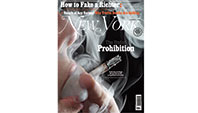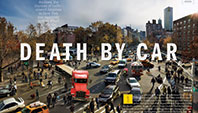
1. In the wake of marijuana’s ballot-box victories in Washington State and Colorado, Benjamin Wallace-Wells’s cover story explored the global drawdown in the war on drugs (“The Truce On Drugs,” December 3). Legalization of all narcotics is unlikely and, to many, undesirable—“I think doctors would overwhelmingly agree that unlimited access for adults to drugs such as OxyContin would lead to drastically increased addiction,” wrote one commenter on nymag.com. “That is the logical extension of the case for legalization of drugs such as cocaine, heroin, and meth, and it is a scary thought.” But, as another commenter put it, “I always have thought that pot should be grown and sold locally …The cops need to concentrate on meth, bath salts, and designer drugs … Time to make some logical moves.” Those moves may be coming about for reasons other than increased social acceptance: “It’s a push that can’t be separated from the current economic climate,” wrote Whet Moser on Chicago magazine’s blog the 312. “Economic crisis forces us to reconsider what the government does and doesn’t do … Science and advocacy got the push for legalization a long ways, but the Great Recession has pushed it to the brink.” Yet how much further will the drug détente go? “I’m beginning to suspect that the [Obama] administration will try to set some kind of policy course intended to be as low-key and neutral as possible,” wrote Paul Waldman at the American Prospect blog. “While Obama may believe that the War has been a failure, it just isn’t all that high on his priority list … As the first president who admits to being an enthusiastic pot smoker in his youth (and of course the first black president), he’ll be the last person to begin the dismantling of the War on Drugs.” And still others, like David Wagner at the Atlantic Wire, saw roadblocks within the drug industry itself: “Common sense would seem to suggest that growers would favor legalization, but the reality is a bit hazier. Some of the biggest growers operating in this burgeoning semi-legal industry oppose legalization altogether … After all, even the most liberal legislation at the state level doesn’t change the fact that the Feds are sticking to their hard-line approach in the war on drugs.”

2. “Please everyone let’s look both ways before we cross the street and also let’s all hold hands and also probably stay in our houses, forever,” wrote Logan Sachon at the Billfold after reading Robert Kolker’s article on the sudden increase in New York’s traffic fatalities and what the city should be doing about it (“Death by Car,” December 3). Readers expressed similar surprise and concern. “The police also need to start giving out tickets to drivers who are obviously negligent,” wrote one. “Most drivers are pretty good, but there are a tiny fraction of really bad drivers on the road. When you have as many drivers on the road as there are in NYC, a tiny fraction of such a large number ends up being another pretty big number.” “It’s a nightmare,” added a commenter identified as a resident of the Lower East Side. “I have never (in 17 years) seen a driver pulled over on either Allen or East Houston for running a red light. It’s amazing there aren’t more pedestrian accidents. Between that and drunk driving, one takes their life in their hands on the streets of NYC.” Of course, there were also those who thought the blame was unequally divided: “I absolutely support increased policing of illegal driving, but pedestrians have a responsibility to use their common sense and to be attentive, too … Drivers will always make mistakes, cars will always outweigh humans … Pedestrians need to share some sense of awareness of the dangers that come from mixing cars, walkers, and bikes on the same streets.” “I drive frequently,” said another reader, “and every day without fail I see people on their phones/texting and walking … It’s extremely unsafe.” Over at Streetsblog, Ben Fried weighed in: “His story gets a lot of things right,” but “while Kolker nicely conveys the police department’s failures to enforce traffic laws and investigate crashes, he doesn’t dig into NYPD’s stubborn refusal to shed light on why and where traffic injuries happen … With a few more details about [Police Commissioner Ray] Kelly’s failures the piece could have upped the pressure on NYPD to take street safety seriously.”
Send correspondence to: nymletters@nymag.com